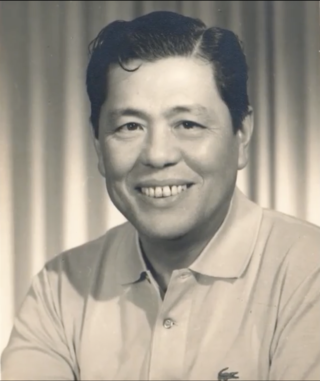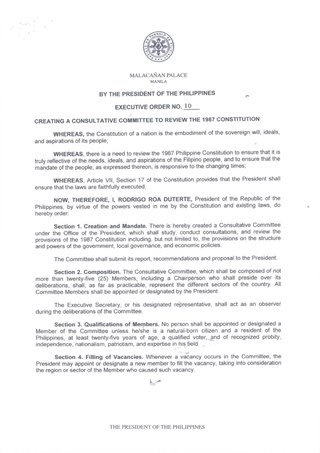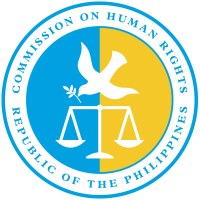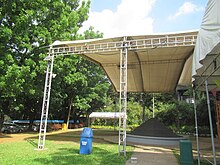
Maria Angelita Ressa is a Filipino and American journalist. She is the co-founder and CEO of Rappler. She previously spent nearly two decades working as a lead investigative reporter in Southeast Asia for CNN. She will become Professor of Professional Practice in the School of International and Public Affairs at Columbia University on July 1, 2024, and will be a Distinguished Fellow at Columbia's new Institute of Global Politics beginning in the fall of 2023.
Human rights in the Philippines are protected by the Constitution of the Philippines, to make sure that people in the Philippines are able to live peacefully and with dignity, safe from the abuse of any individuals or institutions, including the state.

Jose Wright Diokno, also known as "Ka Pepe", was a Filipino nationalist, lawyer, and statesman. Regarded as the "Father of Human Rights," he served as Senator of the Philippines, Secretary of Justice, founding chair of the Commission on Human Rights, and founder of the Free Legal Assistance Group (FLAG), the premier group of Filipino human rights lawyers. Diokno is the only person to top both the Philippine Bar Examination and the board exam for Certified Public Accountants (CPA). His career was dedicated to the promotion of human rights, the defense of Philippine sovereignty, and the enactment of pro-Filipino economic legislation.
The Davao Death Squad (DDS) is a vigilante group in Davao City, Philippines. The group is alleged to have conducted summary executions of street children and individuals suspected of petty crimes and drug dealing. It has been estimated that the group is responsible for the killing or disappearance of between 1,020 and 1,040 people between 1998 and 2008. The 2009 report by the CHR noted stonewalling by local police under Duterte while a leaked cable observed a lack of public outrage among Davao residents.

The National Youth Commission, also known as the NYC, is a government agency in the Philippines that specifically addresses issues surrounding the Filipino youth. It was founded on June 30, 1995, via Republic Act 8044 or the "Youth in Nation-Building Act of 1995".
The Presidential Commission on Good Government (PCGG) is a quasi-judicial government agency of the Philippines whose primary mandate is to recover the ill-gotten wealth accumulated by Ferdinand Marcos, his immediate family, relatives, subordinates and close associates, whether located in the Philippines or abroad. It was created by President Corazon Aquino shortly after she was sworn in as president in the aftermath of the 1986 People Power revolution. In addition to recovering the Marcos wealth, it is also tasked with investigating other cases of graft and corruption; and instituting of corruption prevention measures.
Loretta Ann Pargas Rosales is a Filipina activist, teacher and politician who has served three terms as the party-list representative of the Akbayan Citizens' Action Party to the Philippines' House of Representatives from the 11th-13th Congress (1998-2007). She was the Chairperson of the Commission on Human Rights of the Republic of the Philippines from 2010 to 2015.

Jose Manuel Tadeo "Chel" Icasiano Diokno is a Filipino lawyer, educator, and human rights advocate. He serves as chairman of the Free Legal Assistance Group (FLAG), the founding dean of the De La Salle University College of Law, and the chairman of the Bantayog ng mga Bayani Foundation. He has served as a special counsel of the Senate Blue Ribbon Committee. He was a candidate for the Senate in 2019 and 2022.

Rappler is a Filipino online news website based in Pasig, Metro Manila, the Philippines. It was founded by 2021 Nobel Peace Prize laureate Maria Ressa along with a group of fellow Filipino journalists as well as technopreneurs. It started as a Facebook page named MovePH in August 2011 and evolved into a website on January 1, 2012.

The Free Legal Assistance Group (FLAG) is a nationwide organization of human rights lawyers in the Philippines. It was founded in 1974 by Sen. Jose W. Diokno, Lorenzo Tañada, J.B.L. Reyes, and Joker Arroyo during the martial law era under former President Ferdinand Marcos. It is the first and largest group of human rights lawyers established in the nation. They work on countering varied abuses against human rights and civil liberties. Its current chairman since 2003 is human rights attorney Chel Diokno, the founding dean of the De La Salle University Tañada-Diokno School of Law.

The burial of Ferdinand Marcos, a former Philippine President who ruled as a dictator for 21 years, took place on November 18, 2016, at the Libingan ng mga Bayani in Fort Andres Bonifacio, Taguig, Metro Manila, Philippines. Marcos had been elected the 10th President of the Philippines in 1965, but declared Martial Law in 1972 before his final constitutionally allowed term was over, holding on to power until his overthrow by the People Power Revolution in 1986.
On April 27, 2017, a scandal arose when a team from the Commission of Human Rights (CHR) raided the Manila Police District (MPD) station 1 in Tondo, Manila, Philippines and discovered that about 12 men and women were being detained inside a cell hidden behind a bookshelf. It was reported that these prisoners inside the said cell were being held by the police allegedly to be released only upon payment of ransom.

Executive Order No. 10 was signed on December 7, 2016, by Philippine President Rodrigo Duterte which created a consultative committee to review the 1987 Constitution of the Philippines. The move officially set in motion the process for amending the 30-year-old charter and set up a federal system of government in the Philippines aimed at ending the Moro conflict and further opening up of the Philippine economy.

Proclamation No. 216 was the 2017 proclamation of martial law and suspension of the privilege of the writ of habeas corpus in the whole of Mindanao amid clashes between government forces and Maute group terrorists in Marawi, issued by Philippine President Rodrigo Duterte on May 23, 2017. The state of martial law was extended thrice by Congress at the request of Duterte, citing necessity to quell hostile activities perpetrated by terrorist groups, and ended with the third extension lapsing on December 31, 2019.
Edmundo "Ed" Guidote Garcia is a Filipino human rights activist, peace advocate, and writer.

Maria Serena Encarnacion Icasiano Diokno, also known as Maris, is a Filipino historian, academic, and former government official best known for having served as chair of the National Historical Commission of the Philippines (NHCP) and as a high-ranking official of the University of the Philippines (UP) system. She graduated UP magna cum laude and earned a PhD in African and Oriental studies at the University of London in 1983. Diokno succeeded fellow historian Ambeth Ocampo as chairperson of the NHCP on April 7, 2011. She resigned from her position on November 29, 2016, in response to the burial of former president Ferdinand Marcos at the Libingan ng mga Bayani in Taguig, Metro Manila.

Menardo Ilasco Guevarra is a Filipino lawyer serving as Solicitor General of the Philippines since 2022 under President Bongbong Marcos. He previously served as the Secretary of Justice under President Rodrigo Duterte and as a commissioner of the Philippine Competition Commission under President Benigno Aquino III. Before joining the government, he was involved in private litigation practice as a founding partner of the Medialdea Ata Bello Guevarra & Suarez law firm since 1990. He was also an active faculty member at his alma mater Ateneo de Manila University, where he graduated in 1974.
Red-tagging in the Philippines is the malicious harassment and blacklisting of individuals or organizations critical or not fully supportive of the actions of a sitting government administration in the country. These individuals and organizations are "tagged" as either communist or terrorist or both, regardless of their actual political beliefs or affiliations. It is a type of incitement and has pernicious effects on its targets. Red-tagging may be performed by either security forces, government officials or shills.

The National Task Force to End Local Communist Armed Conflict (NTF-ELCAC) is a task force organized by the government of the Philippines to respond and raise awareness to the ongoing communist rebellion in the Philippines.
The first 100 days of Rodrigo Duterte's presidency began on June 30, 2016, the day Rodrigo Duterte was inaugurated as the 16th president of the Philippines. The concept of the first 100 days of a presidential term was first adopted in the Philippines by President Corazon Aquino from the United States and has since been used as a gauge of presidential success and activism, and is a considered the "honeymoon period" where traditional critics are urged to refrain from detracting the new president. The 100th day of his presidency ended at noon on October 8, 2016.
















